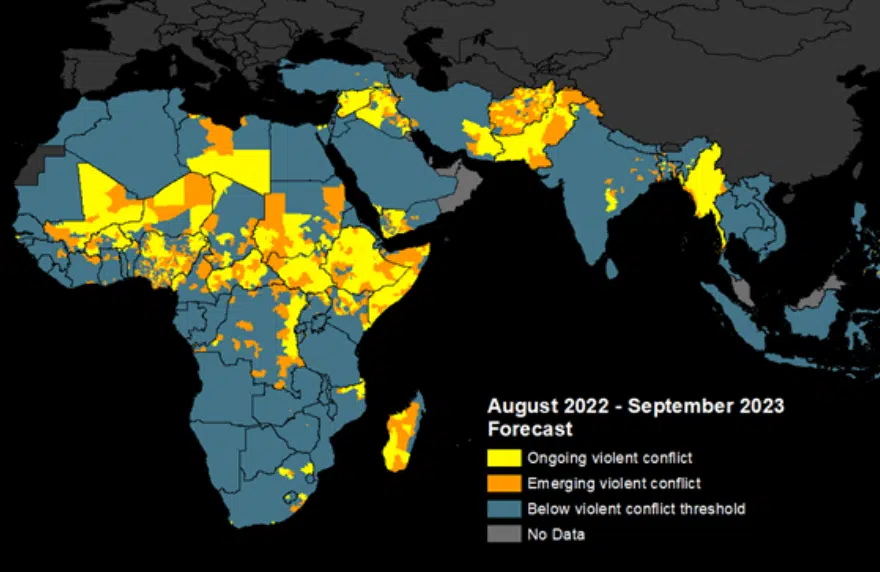Drought that threatens a fourth consecutive growing season in parts of Ethiopia, Kenya and Somalia puts the countries at risk of emerging conflicts, according to a new quarterly update that analyzes findings from a global early warning tool.
The update, issued by the Water, Peace and Security (WPS) partnership, also warns that floods in South Sudan and dwindling water resources in northern Cameroon could lead to conflict, and observes that the Middle East continues to be riddled by instability and protests related to a dire water situation.
The tool applies machine learning to predict possible conflict up to a year in advance. The WPS Partnership’s latest update, based on an analysis of December 2021 data and focusing on the next 12 months, also predicts ongoing or emerging conflict in Syria, Iraq, Afghanistan and parts of the Philippines, among others, and notes that water-related challenges may be among the drivers of such conflict.
The tool is developed and maintained by the WPS Partnership, which includes experts from the World Resources Institute, Deltares, IHE Delft Institute for Water Education, The Hague Centre for Strategic Studies, Wetlands International and International Alert.
The latest update predicts emerging or continuing conflict for the next 12 months in much of the Tigris-Euphrates Basin, noting that “the entire region is caught in a complex struggle with water insecurity and its many implications for people and the economies, as well as regional stability more broadly.”
WPS coordinator Susanne Schmeier, IHE Delft Associate Professor in Water Law and Diplomacy, said the region’s challenges are complex and interlinked.
“As drought conditions continue in the Euphrates-Tigris Basin, countries such as Iraq, Iran and Syria – all struggling with ineffective water management and policies – will continue to see protests and instability, but also a continuously increasing risk of regional tensions over shared water resources,” she said.
In Ethiopia, the update notes that fighting, instability and a weakening of the state undermine its ability to address drought and its dire consequences. The tool predicts conflict in southern and eastern Ethiopia – this would be in addition to the conflict that begun in November 2020 in the northern part of the country.
“The drought is threatening a fourth consecutive growing season, leaving rural inhabitants with few assets to continue to sustain themselves. Many, facing dire prospects, are forced to leave their homes in search of alternative livelihood options,” said Charles Iceland, Director of Global and National Initiatives at the World Resources Institute.
There is, however, also hope. New technology that makes desalination of water cheaper has enabled Israel to sell water to Jordan, one of the world’s most water-insecure countries. Though tensions around water between Jordan and Israel continue, the two countries in November 2021 signed a declaration of intent for a deal that would see Jordan export solar-produced energy to Israel in return for water deliveries. The tool does not predict extensive violent conflict in Israel or Jordan over the next 12 months.
The WPS Global Early Warning Tool, launched in 2019, employs 15-20 global indicators proven to be the most significant from among more than 200 considered.
About the Water, Peace and Security partnership
The WPS partnership was set up in 2018 to pioneer the development of innovative information tools and practical approaches that can support local and international actors who work in high-risk areas. These tools and approaches can help predict and prevent water-related security threats in a timely manner. The WPS partnership includes an expanding group of organizations supported by The Netherlands Ministry of Foreign Affairs and the German Gesellschaft fur Internationale Zusammenarbeit (GIZ). The current partners include: IHE Delft (lead), World Resources Institute, Deltares, The Hague Centre for Strategic Studies, Wetlands International and International Alert. In addition, the consortium collaborates with a growing number of other organizations, including: Oregon State University and Clingendael – the Netherlands Institute of International Relations.

